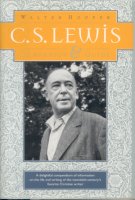 C. S. Lewis: A Companion and Guide by Walter Hooper (Harper San Francisco, 1996)
C. S. Lewis: A Companion and Guide by Walter Hooper (Harper San Francisco, 1996)
At over 940 pages in length, this is not a book for casual reading, although it is in large measure quite readable, and over time I read it all. It is more of a reference book, and as it covers nearly everything Lewis wrote, I've found it an invaluable "companion" on my "C. S. Lewis retrospective" journey. Hooper provides the background for each book, which I found by far the most interesting part, along with summaries of both the text and its reviews.
Despite its reference-book nature, I still found a few quotes to pass on.
When [Lewis] was seventeen, he learned that Arthur Greeves was ill, and wrote to him ... "Cheer up, whenever you are fed up with life, start writing: ink is the great cure of all human ills, as I have found out long ago." (p. 49)
That is the truth.
From Canto I of Lewis's poem, Dymer:
At Dymer’s birth no comets scared the nation,
The public crèche engulfed him with the rest,
And twenty separate Boards of Education
Closed round him. He passed through every test,
Was vaccinated, numbered, washed and dressed,
Proctored, inspected, whipt, examined weekly,
And for some nineteen years he bore it meekly. (p. 149)
Although written a hundred years ago, as a prophecy of modern American childhood it is chillingly accurate.
In the letter to Arthur Greeves of 18 August 1930 he said: "The side of me which longs, not to write, for no one can stop us doing that, but to be approved as a writer, is not the side of us that is really worth much. And depend upon it, unless God has abandoned us, he will find means to cauterize that side somehow or other." (p. 155)
From a letter to the publisher of Letters to Malcolm:
Would it be good to say "Some passages are controversial but this is almost an accident. The wayfaring Christian cannot quite ignore recent Anglican theology when it has been built as a barricade across the high road." (p. 380, emphasis mine)
Pauline Baynes, the illustrator of his Narnia books, speaking of a meeting with Lewis:
He answered, "Things one finds easy are invariably the best." This took a lot of thinking about, for though it is of course logical, up till then I had thought that nothing could be worthwhile that had not been a battle, a difficulty overcome, and that good things could only come after a lot of hard work and rubbing out. Of course he was right: if one knows about something so that you can draw it effortlessly it will be fluent and direct. (p. 407)


